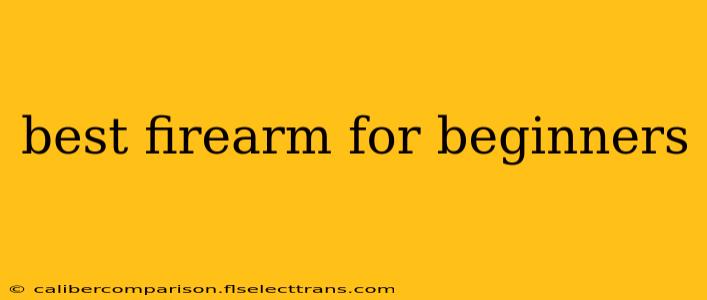Choosing your first firearm is a significant decision. It's crucial to select a gun that's safe, easy to handle, and suitable for your intended purpose, whether that's self-defense, target shooting, or hunting. This guide will help you navigate the options and make an informed choice, emphasizing safety above all else.
Disclaimer: This information is for educational purposes only. Always consult with a qualified firearms instructor and adhere to all local, state, and federal laws regarding firearm ownership and use. Safe gun handling practices are paramount.
Factors to Consider Before Choosing Your First Firearm
Before diving into specific firearm types, consider these crucial factors:
1. Intended Use:
- Self-defense: This necessitates a firearm easy to operate under stress, reliable, and effective at close range.
- Target shooting: Accuracy and precision are key here. Different calibers and actions cater to varying skill levels and target types.
- Hunting: Caliber selection is crucial, dependent on the game you intend to hunt. Larger game requires more powerful cartridges.
2. Caliber:
Caliber refers to the diameter of the bullet. Smaller calibers (.22LR, .380 ACP) generally have less recoil, making them easier for beginners to manage. Larger calibers (.45 ACP, .40 S&W) pack more stopping power but produce significant recoil.
3. Action Type:
- Revolvers: Simple, reliable, and generally easy to learn. They offer a visible cylinder showing the number of rounds remaining.
- Semi-automatic pistols: More common, offering higher capacity magazines. They require understanding of the mechanics, including loading, unloading, and malfunction clearing.
- Shotguns: Versatile for self-defense and hunting, but require more training to handle effectively due to the spread of shot.
4. Size and Weight:
Choose a firearm that's comfortable to hold and easy to manipulate. Too small a gun can be difficult to grip securely, while an overly large gun might be cumbersome.
Recommended Firearms for Beginners:
Based on ease of use, reliability, and safety, here are some options frequently recommended for first-time gun owners:
1. .22LR Revolver:
- Pros: Extremely low recoil, affordable ammunition, simple operation, readily available. Ideal for learning fundamental shooting skills.
- Cons: Limited stopping power for self-defense.
2. .22LR Semi-Automatic Pistol:
- Pros: Low recoil, affordable ammunition, allows practice with semi-automatic operation.
- Cons: Still limited stopping power compared to larger calibers.
3. 9mm Semi-Automatic Pistol:
- Pros: Common, relatively low recoil (compared to larger calibers), widely available ammunition, good balance of stopping power and manageability. A popular choice for self-defense.
- Cons: Requires more training than a .22LR to master.
The Importance of Training
Regardless of your chosen firearm, professional training is non-negotiable. A qualified instructor can teach you safe gun handling, proper shooting techniques, and how to respond to malfunctions. This is the single most important factor in responsible firearm ownership.
Seek out certified instructors in your area, and don't hesitate to ask questions. Your safety and the safety of others depend on it.
Beyond the Firearm: Essential Accessories
- Holster: For safe and convenient carrying (if applicable).
- Eye and ear protection: Essential for safe shooting.
- Ammunition: Buy quality ammunition from reputable sources.
- Cleaning kit: Regular cleaning maintains the firearm's reliability.
- Gun safe or lockbox: Secure storage is crucial for firearm safety.
Choosing your first firearm is a serious undertaking. Prioritize safety, training, and responsible ownership. By carefully considering these factors and seeking expert guidance, you can make an informed decision that sets you on the path to safe and enjoyable shooting. Remember to always practice responsible gun ownership and adhere to all applicable laws.

